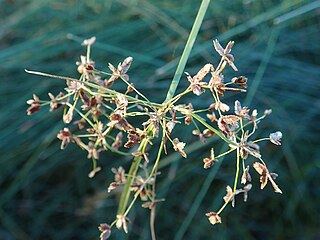
Coronidium scorpioides, commonly known as the button everlasting, is a perennial herbaceous shrub in the family Asteraceae found in Australia. Previously known as Helichrysum scorpioides, it was placed in the newly described genus Coronidium in 2008.
Bulbostylis burbidgeae is a flowering plant in the sedge family, Cyperaceae, that is native to Western Australia.
Cyathochaeta equitans is a sedge of the family Cyperaceae that is native to Australia.
Cyperus astartodes is a sedge of the family Cyperaceae that is native to northern parts of Australia.
Cyperus blakeanus is a sedge of the family Cyperaceae that is native to Australia.
Cyperus centralis is a sedge of the family Cyperaceae that is native to arid areas of central Australia.

Cyperus concinnus is a sedge of the family Cyperaceae that is native to Australia, and found in New South Wales, Queensland, the Northern Territory, South Australia, Victoria and Western Australia.
Cyperus crispulus is a sedge of the family Cyperaceae that is native to Australia and found in Western Australia, and the Northern Territory.
Cyperus hesperius is a sedge of the family Cyperaceae that is native to Australia.
Cyperus latzii is a sedge of the family Cyperaceae that is native to Australia, and found in the Northern Territory and Western Australia.
Cyperus nutans is a sedge of the family Cyperaceae that is native to Australia, China, India, Bangladesh, south-east Asia, Malaysia, India, and Indonesia.
Cyperus orgadophilus is a sedge of the family Cyperaceae that is native to Australia, in Western Australia, the Northern Territory, and Queensland.
Cyperus portae-tartari is a sedge of the family Cyperaceae that is native to Australia, and found in the Northern Territory and Western Australia.
Cyperus viscidulus is a sedge of the family Cyperaceae that is native to north western Australia.
Cyperus vorsteri is a sedge of the family Cyperaceae native to KwaZulu-Natal in South Africa.
Eleocharis jacobsiana is a sedge of the family Cyperaceae that is native to Western Australia.
Eleocharis rivalis is a sedge of the family Cyperaceae that is native to the Kimberley region of Western Australia.
Eleocharis sanguinolenta is a sedge of the family Cyperaceae that is native to the Kimberley region of Western Australia.
Eleocharis triquetra is a sedge of the family Cyperaceae that is native to the Kimberley region of Western Australia.

Schoenus calcatus is a species of Cyperaceae endemic to Western Australia.






